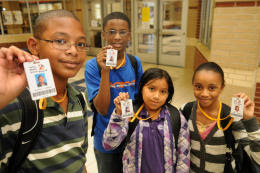The wire was attached to a strange magnetic device that puzzled Afifi and the mechanic. They freed it from the car and posted images of it online, asking for help in identifying it.
Two days later, FBI agents arrived at Afifi's Santa Clara apartment and demanded the return of their property — a global positioning system tracking device now at the center of a raging legal debate over privacy rights.
One federal judge wrote that the widespread use of the device was straight out of George Orwell's novel, "1984".
"By holding that this kind of surveillance doesn't impair an individual's reasonable expectation of privacy, the panel hands the government the power to track the movements of every one of us, every day of our lives," wrote Alex Kozinski, the chief judge of the 9th U.S. Circuit Court of Appeals, in a blistering dissent in which a three-judge panel from his court ruled that search warrants weren't necessary for GPS tracking.
But other federal and state courts have come to the opposite conclusion.

Law enforcement advocates for the devices say GPS can eliminate time-consuming stakeouts and old-fashioned "tails" with unmarked police cars. The technology had a starring role in the HBO cops-and-robbers series "The Wire" and police use it to track every type of suspect — from terrorist to thieves stealing copper from air conditioners.
That investigators don't need a warrant to use GPS tracking devices in California troubles privacy advocates, technophiles, criminal defense attorneys and others.
The federal appeals court based in Washington D.C. said in August that investigators must obtain a warrant for GPS in tossing out the conviction and life sentence of Antoine Jones, a nightclub owner convicted of operating a cocaine distribution ring. That court concluded that the accumulation of four-weeks worth of data collected from a GPS on Jones' Jeep amounted to a government "search" that required a search warrant.
Judge Douglas Ginsburg said watching Jones' Jeep for an entire month rather than trailing him on one trip made all the difference between surveilling a suspect on public property and a search needing court approval.
"First, unlike one's movements during a single journey, the whole of one's movements over the course of a month is not actually exposed to the public because the likelihood anyone will observe all those movements is effectively nil," Ginsburg wrote. The state high courts of New York, Washington and Oregon have ruled similarly.
The Obama administration last month asked the D.C. federal appeals court to change its ruling, calling the decision "vague and unworkable" and arguing that investigators will lose access to a tool they now use "with great frequency."
After the D.C. appeals court decision, the 9th Circuit refused to revisit its opposite ruling.
The panel had concluded that agents could have gathered the same information by following Juan Pineda-Moreno, who was convicted of marijuana distribution after a GPS device alerted agents he was leaving a suspected "grow site."
"The only information the agents obtained from the tracking devices was a log of the locations where Pineda-Moreno's car traveled, information the agents could have obtained by following the car," Judge Diarmuid O'Scannlain wrote for the three-judge panel.
Two other federal appeals court have ruled similarly.
In his dissent, Chief Judge Kozinski noted that GPS technology is far different from tailing a suspect on a public road, which requires the active participation of investigators.
"The devices create a permanent electronic record that can be compared, contrasted and coordinated to deduce all manner of private information about individuals," Kozinksi wrote.
Legal scholars predict the U.S. Supreme Court will ultimately resolve the issue since so many courts disagree.
George Washington University law professor Orin Kerr said the issue boils down to public vs. private. As long as the GPS devices are attached to vehicles on public roads, Kerr believes the U.S. Supreme Court will decide no warrant is needed. To decide otherwise, he said, would ignore a long line of previous 4th Amendment decisions allowing for warrantless searches as long as they're conducted on public property.
"The historic line is that public surveillance is not covered by the 4th Amendment," Kerr said.
All of which makes Afifi's lawyer pessimistic that he has much of a chance to file a successful lawsuit challenging the FBI's actions. Afifi is represented by Zahra Billoo of the Council on American-Islamic Relations, the country's largest Islamic civil rights group.
Afifi declined comment after spending last week fielding myriad media inquiries after wired.com posted the story of his routine oil change and it went viral on the Internet.
Still, Billoo hopes the discovered GPS tracking device will help publicize in dramatic fashion the issue of racial profiling the lawyer says Arab-Americans routinely encounter.
She said Afifi was targeted because of his extensive ties to the Middle East, which include supporting two brothers who live in Egypt and making frequent overseas trips. His father was a well-known Islamic-American community leader who died last year in Egypt.
"Yasir hasn't done anything to warrant that kind of surveillance," Billoo said. "This was a blatant example of profiling."
